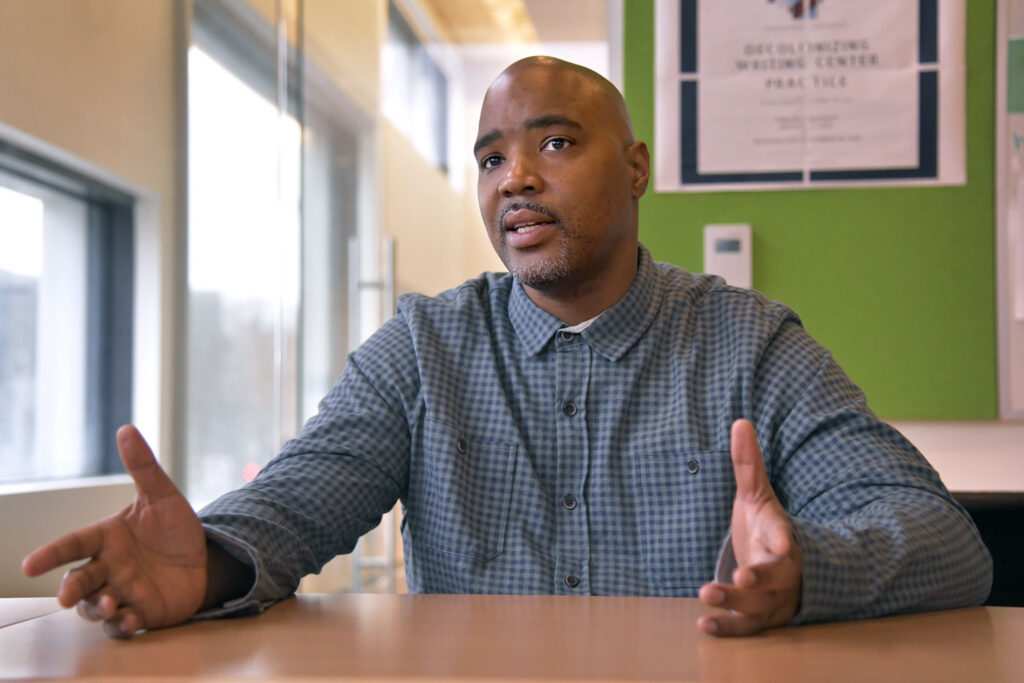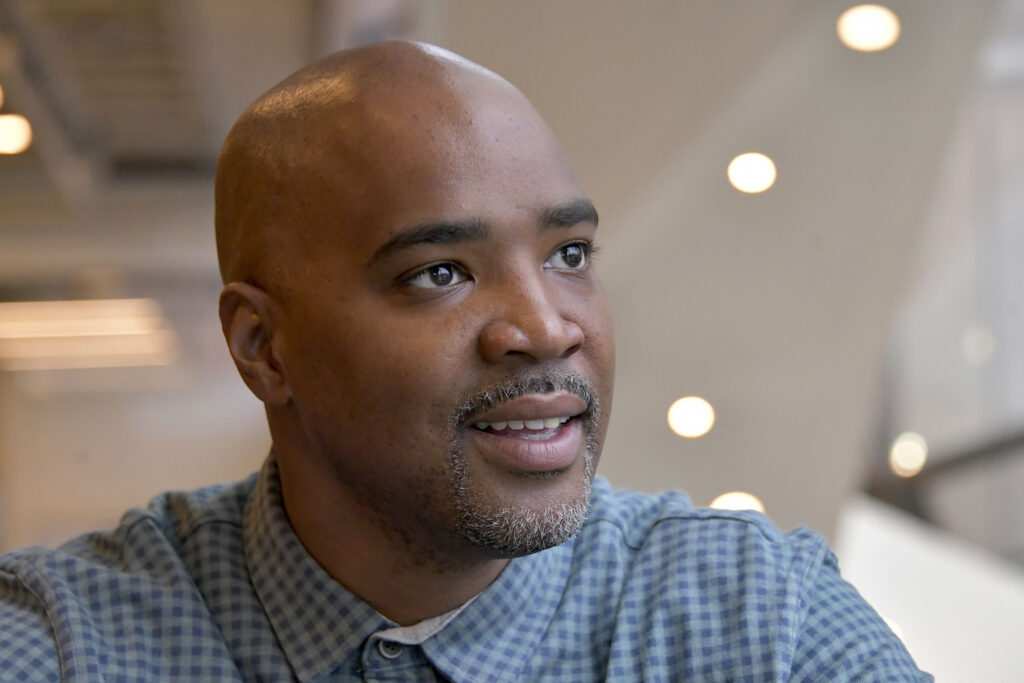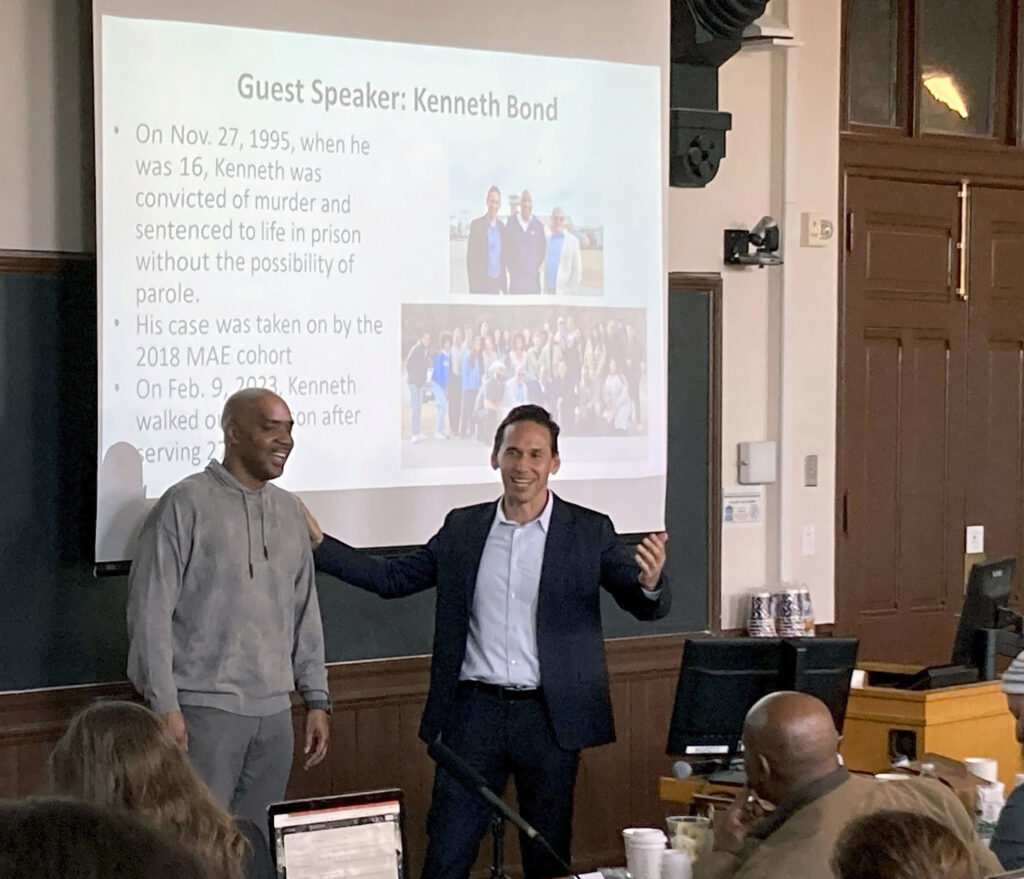Kenneth Bond stood before a packed classroom in late February, rapt students watching from rows of desks in an ornate Georgetown University building.
He told the students that their class investigation of the criminal cases and trials that landed people in prison offers those incarcerated people hope — hope for their lives, hope to their families, hope that their claims of innocence would be heard.
It’s a “heavy thing,” he acknowledged, because those people’s “dreams and designs for the future” would rest upon that semester’s work. But it would be worth it.
“Freedom is life-changing. Freedom is empowering,” Bond told the students, just 15 days after his own release from prison.

The 44-year-old Baltimore man spent nearly three decades behind bars for a shooting that killed a man and wounded a boy, despite what his attorneys allege are flaws in his conviction and his unwavering declarations of innocence.
Bond walked out of prison Feb. 9, free for the first time since his teenage years. He owed his freedom to the work of previous students in Georgetown University’s Making an Exoneree course, the new legal representation it inspired, and a state law offering prisoners convicted of crimes in childhood a chance to have their life sentences reduced. Bond joined the roughly two dozen people freed in Maryland’s first year under the Juvenile Restoration Act.
Now, he’ll continue to push his innocence from the outside, freer to fully participate in his case, Bond and his attorneys have said.
His long fight to persuade a court to take another look at his case and the difficult decisions he was forced to make around his release exemplify some of the criminal legal system’s cruelties, advocates said.
Despite it all, Bond said he isn’t bitter or cynical.

He explained it as a survival tactic to the Georgetown class: Staying “hopelessly optimistic” about his case enabled him to make a “heaven of this hell.”
Marc Howard, Bond’s attorney and co-leader of the Georgetown course, beamed as Bond spoke to students.
The two met years ago when Howard taught a noncredit course at Bond’s prison, the Jessup Correctional Institution. They became friends and, when Howard launched Making an Exoneree in spring 2018, Bond’s case was one of the inaugural cohort’s focuses.
It took five years for that work to bear fruit.
“Even when it’s just obvious and true to anybody, it’s still so hard to overcome a system that is hellbent on keeping people in prison, no matter what,” Howard told his class.

“But we pushed and pushed and pushed, and — Kenneth — it just means everything to reach this point.”
———
The killing of Terrence McKoy, a Morgan State University student, captured headlines in 1995. The 19-year-old freshman, a Prince George’s County native, was shot at a bus stop across from the Northeast Baltimore campus in what police labeled an attempted robbery.
A 10-year-old boy, Robert Lucas, also was struck. Lucas was on his way to a tutoring session, to help bring his grades up enough to play basketball, his parents told reporters at the time.
Within days, Bond, then 16, was charged in the shootings and convicted about two years later. He was sentenced to life plus 60 years.
He didn’t testify at trial, where his then-attorney — who later was suspended indefinitely from the state bar for rule violations — decided against presenting his alibi, Bond and his new attorneys say.
They contend that prosecutors’ case against him was thin: There was no motive or known relationship, no murder weapon and no physical evidence tying Bond to the crime scene. The case relied largely on one eyewitness, who wavered at trial about the certainty of his identification, Bond’s attorneys say, and ballistics evidence that has been called into question.
A documentary produced by the Georgetown course in 2018 laid out the sparse evidence and questions about the case. Bond felt certain then that his claims would be heard.
“I thought, like, it shouldn’t be long,” Bond recalled in an interview. “I stayed in that state from 2018 to when I was released. I didn’t order packages, because ‘No, I’m ready to go home.’”
But the wheels of the system moved slowly. The students’ research led to new legal representation from the Mid-Atlantic Innocence Project and a law firm that took the case pro bono. The team, including Georgetown’s Howard, presented Bond’s case to the Baltimore State’s Attorney’s Office Conviction Integrity Unit in early 2020. They hoped that prosecutors would investigate and ultimately join a filing seeking a court finding of innocence, bolstering its credibility for a judge.
Shawn Armbrust, executive director of the Mid-Atlantic Innocence Project, said someone with a strong innocence claim should have it considered “just as fairly as any other circumstance.” In reality, she said, courts are skeptical of the claims without prosecutors’ backing, which makes working with a Conviction Integrity Unit “this incredible prize.”
Baltimore’s Conviction Integrity Unit division chief, Lauren Lipscomb, confirmed the unit had an application from Bond. She didn’t specify its status, but said any application is reviewed and those with “a meritorious claim of factual innocence” continue.
Bond and his attorneys said things seemed to be progressing until the coronavirus pandemic slowed work and limited updates.
Meanwhile, on Oct. 1, 2021, the state’s Juvenile Restoration Act took effect. The law stemmed in part from research showing that people who commit serious crimes as children can age out of criminal behavior, and that children’s emotional development and brain physiology make them less mindful of consequences and more impulsive than adults.
There also is a staggering racial disparity: Black children in Maryland are seven times more likely to be criminally charged as an adult than their white peers in the state, according to 2019 data cited by the Maryland Office of the Public Defender.
Bond faced a difficult decision: He could wait for his case to progress through the Conviction Integrity Unit or seek swift release from prison. Pursuing release, however, carried the risk of losing the “prize” of a Conviction Integrity Unit backing, since the unit’s capacity constraints mean it prioritizes cases for individuals currently incarcerated, not already freed.
Innocent people in prison are forced to make “a lot of really hard choices” — Bond’s being one, Armbrust said.
“The criminal legal system is a really cruel place,” she said. “The system has never been set up to operate in a universe where innocent people are convicted. We know they are.”
Bond held off for months, desperate to be proclaimed innocent and hoping for an update from the State’s Attorney’s Office.
Then, late last spring, after watching fellow prisoners freed, he chose to seek release through the Juvenile Restoration Act.
“You get into this thing where you want to speak it into existence. You want to believe it so much that you know it’s going to happen. But still, in the back of your mind, it’s like, will it ever happen?” Bond said. “Twenty-seven years, that’s a long time to just be hoping.”
In July, his team filed a 35-page motion in Baltimore City Circuit Court laying out Bond’s childhood, the allegedly shaky evidence and his decades of self-improvement. Bond had maintained an infraction-free record since 2005, worked as a sewing machine operator for 15 years, earned his GED diploma, taken numerous college courses, served as a mediator and mentor, and continued a strong relationship with his children, the filing said.
“He is not the same child who entered prison in 1995,” the motion said. “The interests of justice will be better served by a reduction in Mr. Bond’s sentence.”
Becky Feldman, then the head of the State’s Attorney’s Office’s Sentencing Review Unit, who has since left, recommended a reduced sentence for Bond, telling The Baltimore Sun that it was based on Bond’s rehabilitation in prison.
She called the case used to convict him “weak,” but said it remained to be seen how his fight for innocence would fare.
“If it ends up going nowhere, thank God for the JRA,” Feldman said.
Baltimore Circuit Judge Michael DiPietro agreed to reduce Bond’s sentence to life with all but 40 years suspended, leading to his release a week later due to his good time credits.
Wilmarie McKoy, the mother of the Morgan State student Bond was convicted of killing, opposed the motion in a 2022 letter, saying penalties shouldn’t be taken lightly when someone “takes a life of a human.”
Reached by phone, she said if Bond didn’t shoot her son, then she was sorry Bond went to prison. But, she said, the police were sure he’d done it and a jury believed it.
“My prayers always have been that, if he did it, he would turn his life around. And he would meet Terry in heaven and tell him why he did it, if he did it,” McKoy said. “If he didn’t do it, then I’m glad that he’s out. If he did do it, then he has to answer to God.”
Lucas, the then-10-year-old boy shot in the same incident, said he believed Bond had served enough time for something that happened when he was just 16 years old.
“We all make mistakes, depending on your circumstances. You make decisions,” Lucas, now 37, told The Sun. “He just happened to make a decision. Or, if he was innocent, got caught up in a situation that cost him a lot of time. Hey, I’m happy for him.”
———
Now free, Bond is adjusting to life outside prison walls, living in Northeast Baltimore.
He’s mastering a cellphone, and looking forward to traveling — he can’t go abroad, under his parole terms, but wants to see a large body of water. Maybe in Florida, or Ocean City, Maryland.
The University of Baltimore student is close to graduation, and becoming the second graduate, alongside a third he knew from Jessup, to earn a bachelor’s degree after starting in prison. He plans to continue his education, still weighing his options on the best area of study.
Spending more time with his three children and new grandchildren is also a high priority. That includes fulfilling his son’s dream of playing catch with his dad.
“He bought the stuff already and everything,” Bond said, smiling.
Bond’s own childhood, according to a description in his motion for sentence reduction, included homes where he was exposed to drug use and physical abuse. He often missed school and, when he did attend, got bullied. He dropped out after missing too many days and began to hang out with neighbors who sold drugs — leading to juvenile infractions unrelated to the crime for which he received a life sentence.
It was behavior he now regrets and it’s part of what he hopes to focus on now that he’s released, he said. He plans to work with Paving New Pathways, a nonprofit that, among other things, seeks to build young people’s skills around conflict resolution and critical thinking.
“I was part of the problem when I was a young man,” Bond said. “How can I be a part of the solution now?”
The people he left behind in prison, too, aren’t far from his mind.
Prisoners who may have done “horrendous things” were his teachers and mentors, who kept him safe and taught him that everyone regrets things done when they were young, Bond said. He hopes to live his life in a way that shows, through actions and accomplishments, that “there are people in there that may have changed,” he said.
In his own fight moving forward, Bond will have the backing of Howard and the Mid-Atlantic Innocence Project.
A court finding of innocence — through a judge’s consideration of a writ of actual innocence or other legal filing — could free Bond from the terms of his parole, acknowledge wrongdoing against him and lead to the possibility of compensation for his time in prison.
Armbrust said her organization is “committed to proving his innocence and clearing his name.”
To Bond, it would mean removing the label of “killer.”
“That’s not a title I ever want to be labeled as,” Bond said. “I am not that.”
___
© 2023 Baltimore Sun
Distributed by Tribune Content Agency, LLC.



